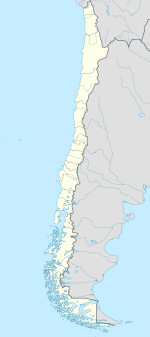
Back Vitacura ACE Vitacura AN Vitacura ANG فيتاكورا Arabic Vitacura AST Vitacura Aymara Vitakura Azerbaijani Vitacura Breton Vitacura CBK-ZAM Vitacura CEB
Vitacura | |
|---|---|
 Parque Bicentenario in Vitacura | |
|
| |
| Coordinates (city): 33°23′00″S 70°34′30″W / 33.38333°S 70.57500°W | |
| Country | Chile |
| Region | Santiago Metro. |
| Province | Santiago |
| Founded | 9 March 1946 |
| Government | |
| • Type | Municipality |
| • Alcalde | Camila Merino (Evópoli) |
| Area | |
| • Total | 28.3 km2 (10.9 sq mi) |
| Population (2023 Census)[3] | |
| • Total | 97,695 |
| • Density | 3,500/km2 (8,900/sq mi) |
| • Urban | 81,499 |
| • Rural | 0 |
| Sex | |
| • Men | 46,908 |
| • Women | 50,787 |
| Time zone | UTC-4 (CLT[4]) |
| • Summer (DST) | UTC-3 (CLST[5]) |
| Area code | 56 + |
| Website | Municipality of Vitacura |

Vitacura is a commune of Chile located in Santiago Province, Santiago Metropolitan Region. It is one of the most expensive and fashionable areas of Santiago. Inhabitants are primarily high income families. It belongs to the Northeastern zone of Santiago de Chile.
There is an abundance of elite private schools in Vitacura and Las Condes, including Saint George's College, Colegio Santa Úrsula, Alliance Francaise, Colegio La Maisonette, Colegio Tabancura, Colegio Los Andes, Colegio Sagrados Corazones de Manquehue and Colegio San Benito.
The Costanera Norte toll-way connects Vitacura with the international airport and subway stations are located in the neighboring municipality of Las Condes.
Vitacura is the site of ECLAC headquarters, home to the European Southern Observatory (ESO) headquarters in Chile, and home to Santiago's most exclusive shopping street, Avenida Alonso de Córdova.
The Gliders Club of Vitacura can be located in this commune. With a privileged location, the area is considered to have ideal climate conditions for such types of flights.
- ^ "Asociación Chilena de Municipalidades" (in Spanish). Archived from the original on 26 January 2011. Retrieved 27 January 2011.
- ^ "Municipality of Vitacura" (in Spanish). Archived from the original on 26 January 2011. Retrieved 27 January 2011.
- ^ a b c "National Statistics Institute" (in Spanish). Retrieved 3 December 2010.
- ^ "Chile Time". WorldTimeZones.org. Archived from the original on 2007-09-11. Retrieved 2010-07-29.
- ^ "Chile Summer Time". WorldTimeZones.org. Archived from the original on 2007-09-11. Retrieved 2010-07-29.
© MMXXIII Rich X Search. We shall prevail. All rights reserved. Rich X Search


